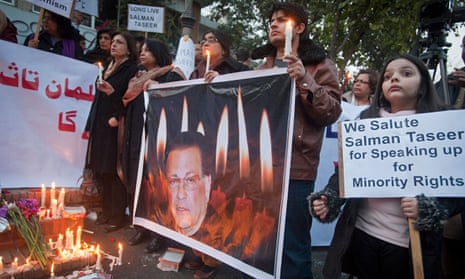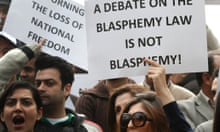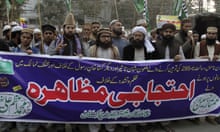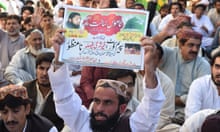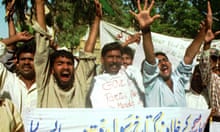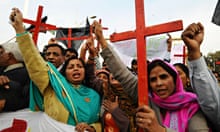In November 2010, Asia Bibi, a Christian mother of five, was sentenced to death in Pakistan. Her crime was allegedly insulting the prophet Muhammad during an argument with some Muslim neighbours. The case caused an international outcry; politicians and international human rights organisations took it up; lawyers appealed. Today, the Lahore high court upheld the death sentence.
Bibi’s case shone a spotlight on Pakistan’s harsh blasphemy laws. The existence of blasphemy laws is not itself unusual. All over the world, different countries restrict what citizens can say about religion; Britain had a blasphemy law until 2008. What is exceptional in Pakistan is the extremity of the penalties, and the light burden of proof. Blasphemy carries a maximum penalty of death, yet the law sets out no standards for evidence, no requirement to prove intent, no punishment for false allegations and, indeed, no guidance on what actually constitutes blasphemy.
The accuser can refuse to repeat the offending statement in court, and judges can choose not to hear evidence in case it perpetuates the blasphemy and offends religious sensibilities. This means that in some cases, the accused can go through a whole trial without knowing what they are supposed to have done or said.
The law is open to massive abuse. As such, it is frequently used to settle personal vendettas and to persecute minorities. Bibi’s alleged blasphemous comments were supposedly made after co-workers refused to share water that she had carried; they said it was unclean because she was a Christian (this is a hangover from the caste system, as most of those who converted to Christianity in pre-partition India were members of the lower castes). She has always maintained her innocence, claiming that these neighbours simply wanted to punish her. The British citizen Mohammed Asghar, who suffers from paranoid schizophrenia, also faces the death sentence for blasphemy. Allegations were made against him in 2010 by a tenant with whom he was having a dispute. No concessions have been made for his mental health condition.
Despite these obvious flaws in the legislation and the way it is applied, reform is not coming. When Bibi’s case came to prominence in 2010, three politicians – Salmaan Taseer, Shahbaz Bhatti and Sherry Rehman – all from the Pakistan People’s Party, which was then in power, took up the case and called for reform. The consequences speak for themselves. Taseer was shot dead by his bodyguard in January 2011. In March the same year, Bhatti was killed by Taliban assassins. Rehman was forced into semi-hiding. The then prime minister shelved all reform, cowed into retreat by the potent mix of extremist threats and mob violence.
Blasphemy excites strong emotions among parts of Pakistan’s public like no other issue. Many people accused of blasphemy are killed by mobs before they even make it to trial. (According to the Islamabad-based Centre for Security Studies, at least 52 people have been killed over blasphemy offences since 1990). Taseer’s assassin was showered with rose petals when he arrived at the courthouse for his murder trial. Many took this as evidence of the way that extremist groups have infiltrated elements of Pakistani society, exploiting the public’s strong religious sensibility and pushing it further towards intolerance.
The power of extremist groups, and the acquiescence of politicians, has had a big impact on the direction of public discussion in Pakistan. The targeting of anyone who speaks out about blasphemy laws has had a chilling effect, and even outspoken liberal voices are reluctant to make the case for reform publicly. Several years ago, while living in Karachi, I wrote on the subject for one of Pakistan’s leading liberal English-language newspapers. The editors decided not to publish it because the subject was deemed too risky.
While this self-censorship is entirely understandable in a country where the authorities provide little protection, it gives extremist ideas the space to flourish and grow. Without people in the halls of power willing to stand up and call for change, there is little hope for Bibi, Asghar and the hundreds of other disenfranchised people sentenced to death under these excessive and nonsensical laws.
- This article was amended on 18 October 2014. The author originally wrote that “the existence of blasphemy laws is not itself the problem” which some have pointed out suggests she supports blasphemy laws in general, which is not the case. This has now been reworded at her suggestion.
